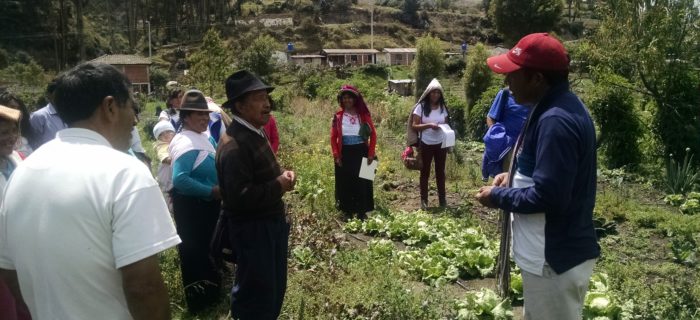Jornadas Agroecologicas: On the Agroecology Trail in Ecuador
In 2009 Ecuador adopted food sovereignty into their constitution. It was a long, hard-fought and well organized campaign carried out by hundreds of Ecuadorian food and farming activists. The law included provisions to ban GMOs, support agroecology and small, organic, and indigenous family farms, healthy food access, local food production, and much more.
So when the Agroecology Collective of Ecuador invited me to participate in the fourth national campaign for agroecology this month, I jumped at the chance. Formed in 2008 in the lead-up to the Food Sovereignty law, the Agroecology Collective is made up of different organizations, networks, groups of farmers, and consumers that have come together to build agroecology and food sovereignty in Ecuador. Their invitation included accompanying them on a staggeringly beautiful road trip from the coast to the Andes. In Guayaquil, Riobamba, Latacunga and Quito we met with farmers, chefs, students, professors and local government officials to share experiences in agroecology and discuss supportive public policies for agroecology. We talked about strategies for movement building. The Campaign itself lasted for a month and was organized by the MESSE (Movement for a Solidarity and Social Economy of Ecuador), comprised of nearly 30 Ecuadorian organizations. Events included 17 different public forums, markets, and festivals at 10 different cities in Ecuador. The goal was bring about a dialogue between the government and civil society regarding the laws and norms that were working for (or against) Ecuador’s food sovereignty. Organizers of the event asserted:
Agroecology and responsible consumption of food is not just a possibility, they exist right now! Their expansion is urgent, because this is the most effective response to the economic and climate crises, to the need for good, healthy food and for the health of our land.
Mostly, I presented research from the Campesino a Campesino movement in Central America, fielded questions about agroecology, and shared the recently-released Spanish version of Fertile Ground: Scaling Agroecology from the Ground Up. I also got to listen to Ecuadorians present and debate about the state of their movement, and even visited some of the farms deep in the Andes. The main question I wondered about was “Has the food sovereignty law made a difference in Ecuador?”
The answer is yes—and no.
Certainly, the food sovereignty movement is strong, and is tightly networked between farmers’ organizations, CSAs, farmers markets, and chefs in the major cities. Agroecology is widely promoted as a practice among many of Ecuador’s indigenous farmers, and is part of the curriculum in its agrarian universities. The indigenous farmers that I met—both men and women—were knowledgeable about agroecology and articulate about food sovereignty. Something that really warmed my heart was the easy familiarity everyone had with the farmer-to-farmer methodologies and was very moved when some of the farmers mentioned they had studied Campesino a Campesino: Voices from Latin America’s Farmer to Farmer Movement for Sustainable Agriculture.
On the other hand, the food sovereignty law has yet to be regulated for legal application. Former president Noel Correa regretted opening up the law’s discussion and formulation process to civil society, and was steadfastly against the moratorium on GMOs. He invoked a clause in the law to permit the entry of GMO seeds for research purposes. Ecuador’s large-scale, conventional agriculture sector is powerful and extensive, taking up the best land and applying copious amounts of chemicals to vegetables and flowers for export.
Many of the people I spoke with in the food sovereignty movement questioned the wisdom of spending so much organizational time and precious resources on the passage of the law, now stuck in limbo between its formulation and regulation. Others were clearly proud of the effort, and felt it was a milestone on the road to regaining democratic control over the country’s food system. All, however, felt that it was time to use the law to grow the social movements for food sovereignty, and advance favorable public policies for smallholders and agroecology. Time will tell if their strategy proves effective.
Stay in the loop with Food First!
Get our independent analysis, research, and other publications you care about to your inbox for free!
Sign up today!


 Help Food First to continue growing an informed, transformative, and flourishing food movement.
Help Food First to continue growing an informed, transformative, and flourishing food movement.




